| Pages:
1
2 |
Hennig Brand
International Hazard
    
Posts: 1284
Registered: 7-6-2009
Member Is Offline
Mood: No Mood
|
|
TATP is Storage Stable
For starters, I don't mean for this to be an endorsement for the use of acetone peroxide, there are much better primaries. I noticed the jar and
realized how long it had been sitting there and thought it was interesting.
This has been stated already by Rosco and maybe others, but TATP is quite storage stable. It does have a high vapor pressure at ordinary temperatures
and readily sublimes.
Here are a few pictures of 2-3 grams of acetone peroxide that was left under a bit of water in a pickle jar for 5 years or more. The jar has been
sitting in the corner of a room at room temperature. It was not in direct sunlight, but it was not protected from normal room light either (not
covered). It has become fairly coarse (about the same as a coarser grade of table sugar). About 0.6g of ETN hand pressed in a paper tube was initiated
with 0.1g of a sample of the TATP which had been removed and let dry over night beforehand. This is a very crude test but it seems to posses the same
qualities as freshly made TATP.
Interestingly, and thankfully, there didn't appear to be any TATP at the top of the jar, or around, or in the threads.
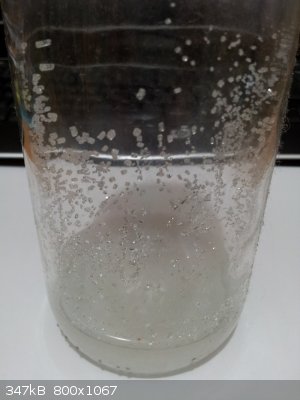 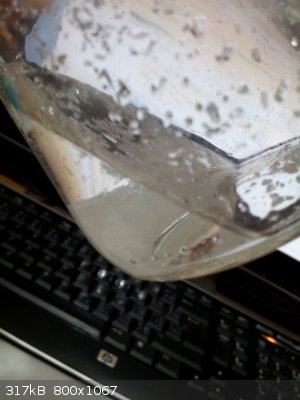 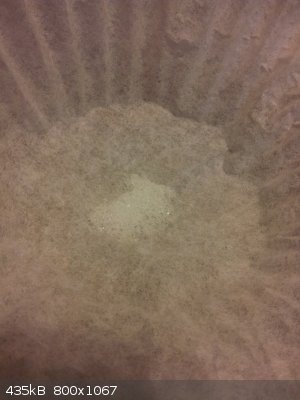
[Edited on 9-8-2015 by Hennig Brand]
"A risk-free world is a very dull world, one from which we are apt to learn little of consequence." -Geerat Vermeij
|
|
|
Bert
Super Administrator
        
Posts: 2821
Registered: 12-3-2004
Member Is Offline
Mood: " I think we are all going to die. I think that love is an illusion. We are flawed, my darling".
|
|
1: An amateur posted results of TATP caps sealed with epoxy in Aluminum cases (re-purposed electrolytic capacitor cans AFAIK) and stored under various
conditions for long periods. Old Roguesci regular, do not recall which one. Same results- It seems to be quite storage stable if well sealed against
subliming away. Still not my cup of tea!
2: Storing primary explosives in glass, and leaving them laying about rather casually for years on end?!
Rapopart’s Rules for critical commentary:
1. Attempt to re-express your target’s position so clearly, vividly and fairly that your target says: “Thanks, I wish I’d thought of putting it
that way.”
2. List any points of agreement (especially if they are not matters of general or widespread agreement).
3. Mention anything you have learned from your target.
4. Only then are you permitted to say so much as a word of rebuttal or criticism.
Anatol Rapoport was a Russian-born American mathematical psychologist (1911-2007).
|
|
|
PHILOU Zrealone
International Hazard
    
Posts: 2893
Registered: 20-5-2002
Location: Brussel
Member Is Offline
Mood: Bis-diazo-dinitro-hydroquinonic
|
|
I confirm that in hermetically sealed recipient CTAP sublimes in very beautifull tiny crystals and stores wel for years (more than one decade now)...
I used 500ml PET soda bottle.
Here are some pictures of very large CTAP crystals I did obtain long ago by a special crystalization process from mother liquor and dense solvent
(TCE: CHCl=CCl2).
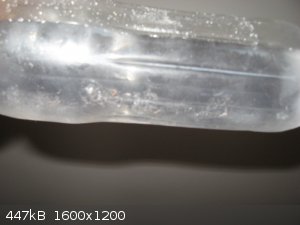 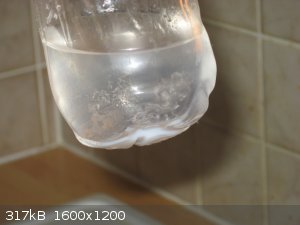 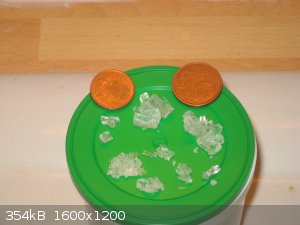 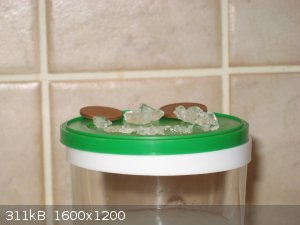
[Edited on 10-8-2015 by PHILOU Zrealone]
PH Z (PHILOU Zrealone)
"Physic is all what never works; Chemistry is all what stinks and explodes!"-"Life that deadly disease, sexually transmitted."(W.Allen)
|
|
|
nitro-genes
International Hazard
    
Posts: 1048
Registered: 5-4-2005
Member Is Offline
|
|
They are indeed nice looking, reminds me of the breaking bad episode with the mercury fulminate, this would certainly qualify  . Just curious, but how do they behave to flame? A friend of mine once lit one of
these medium size crystals, he said it detonated with extreme vigor and lost his hearing at one side for a day. . Just curious, but how do they behave to flame? A friend of mine once lit one of
these medium size crystals, he said it detonated with extreme vigor and lost his hearing at one side for a day.
https://www.youtube.com/watch?v=sGN3SBVIjjA
"you got balls, I got to give you that"
[Edited on 10-8-2015 by nitro-genes]
|
|
|
Hennig Brand
International Hazard
    
Posts: 1284
Registered: 7-6-2009
Member Is Offline
Mood: No Mood
|
|
The plastic PET storage bottle is a good idea. Glass can be hazardous and is best avoided unless there is good reason to use it. Very nice crystals
BTW!
"A risk-free world is a very dull world, one from which we are apt to learn little of consequence." -Geerat Vermeij
|
|
|
NeonPulse
Hazard to Others
  
Posts: 417
Registered: 29-6-2013
Location: The other end of the internet.
Member Is Offline
Mood: Isolated from Reality! For Real this time....
|
|
Philip, how is the procedure that you used is special compared to normal crystallisation methods? I don't wish to copy your procedures i am just
curious on how you got these neat looking crystals? And this took years to complete? Have you broken one remotely to see if it detonates? Great work!
I love to see the various crystal shapes and sizes of energetic materials
|
|
|
PHILOU Zrealone
International Hazard
    
Posts: 2893
Registered: 20-5-2002
Location: Brussel
Member Is Offline
Mood: Bis-diazo-dinitro-hydroquinonic
|
|
One of the main problem with CTAP is its volatility/sublimability.
Usually it makes a fine dusty-floculent material with normal proces.
This is better for safety of handling since large crystals are usually more shock and friction sensitive, but while people try to push it down a
detonator, they also induce friction and pressure to increase density.
If one let it sublimate in a closed recipient, he will get after a few monthes the kind of crystals Hennig Brand displays in his pictures, those can
grow with years to a few mm (1-2 mm large to 5 mm long).
The tiny crystals sublimate faster than the larges ones (specific surface dependant) and there is a kind of "competition/struggle" ...the large
crystals become larger and larger while tiny disappear...but the proces slows down with time because the specific surface is reduced with time while
bigger crystals grows.
In my process, the flocculent CTAP with mother liquor is put in contact with the minimum amount of a dense volatile solvent (a halogenated hydrocarbon
is good for this and especially TCE - trichlorethylen). It dissolves readily CTAP and extract it from the mother liquor (H2O, aceton, aqueous HCl,
H2O2 (30%), CTAP).
TCE has the advantage of displaying a density of 1,46 g/ccm and of being slightly polarized...it is almost unsoluble in the mother liquor but stil a
little.
PET bottles are resistant to TCE, but a tiny quantity may pass through by absorption and volatilisation...the bottle shrink a little and may deform a
bit, while becoming milky (translucent by places).
So what happens?
1°)TCE is saturated with CTAP and mother liquor exhausted.
2°)TCE "evaporates" through bottle walls and through mother liquor (in the liquid phase and in the gaseous phase).
--> So do this in a hood or in outside shadow (not in sunshine!). Don't put this in a fridge or freezer, gaseous TCE will saturate all fatty
material and plastic of your fridge/freezer...giving a bad sweet etheral taste to your butter for example even if there for a few hours!
3°)CTAP concentrâtes, and once TCE oversaturated,it starts to crystallize on the top of the TCE (density CTAP 1,2-1,3) but below the mother liquor
(d= 1,0-1,1).
Mother liquor is in equilibrium for CTAP with the TCE phase so mother liquor feed slowly the tiny, then big crystals below it.
4°)Usually crystals are centered in the bottle (because of a kind of hyperconcentrated oily flat droplet meniscus- both concave and convex floating
in the center at the interface) grow upward and pearce through the interfacial plane between the two solvents.
5°)The process can be accelerated if the bottle is cap untwisted to allow for faster evaporation of TCE (do this outside or in a good hood TCE is a
known hepatotoxic).
6°)So you will get large crystals like mine, but often crystal twinning happens and one core plurigenic crystal flowers are formed. This may be bad
news since on a microcrystalline level, it means disturbance and stress.
Those points display a higher energy level and the activation energy is then lower what means shock and friction sensitivity will be enhanced... thus
beautifull but dangerous (like womens  ). ).
ALWAYS STORE under demi water in soft airtight plastic container, in tiny amount, away from sunlight - heat and UV and treat with the higher respect
and care of a sensitive primary ready to detonate in your hands.
Big crystals are very dense and very dry (inside the crystal latice) so indeed they do deflagro-detonate much easier and stronger than loose CTAP
powder.
Friction between big crystals is also much harder than with amorphous CTAP...so don't shake to listen to the beautifull sound of the crystals hitting
the wall of the recipient!
[Edited on 10-8-2015 by PHILOU Zrealone]
PH Z (PHILOU Zrealone)
"Physic is all what never works; Chemistry is all what stinks and explodes!"-"Life that deadly disease, sexually transmitted."(W.Allen)
|
|
|
Hennig Brand
International Hazard
    
Posts: 1284
Registered: 7-6-2009
Member Is Offline
Mood: No Mood
|
|
Reading what Philou wrote made me think about my sample a little more. It actually hasn't been sitting in the corner of the room at room temperature
for 5 years. I remember now that I took it out of the very back of the fridge sometime in the last year or two. It was in the fridge for at least 4
years before that though. Always meant to discard those last couple of grams, but somehow never got around to it. I guess my interest in the effects
of long term storage was greater than any fear associated with its storage.
Bert, I know my safety practices sometimes leave a lot to be desired.
"A risk-free world is a very dull world, one from which we are apt to learn little of consequence." -Geerat Vermeij
|
|
|
Microtek
National Hazard
   
Posts: 869
Registered: 23-9-2002
Member Is Offline
Mood: No Mood
|
|
Just a little caveat about storing primaries in PET soda bottles: They tend to accumulate a static charge. Also, there is the threaded lid. Both can
quickly ruin your day...
At a minimum you need to store the primary (very) wet.
[Edited on 10-8-2015 by Microtek]
|
|
|
chemrox
International Hazard
    
Posts: 2961
Registered: 18-1-2007
Location: UTM
Member Is Offline
Mood: LaGrangian
|
|
When I was in school an inorganic student got a safety award for only losing three fingers instead of his eyes doing some gas line work with organic
peroxides. There are lots of easy and much safer explosives; search and read. On that subject I noticed questions you had that google would have
yielded answers and other question about basic stoichiometry that if you don't know you should learn before you go fucking around with things that go
'bang.'
"When you let the dumbasses vote you end up with populism followed by autocracy and getting back is a bitch." Plato (sort of)
|
|
|
| Pages:
1
2 |